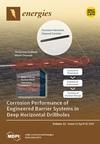减少单相并网全桥式逆变器滑动模式控制器零交叉失真的混合换向技术
IF 3
4区 工程技术
Q3 ENERGY & FUELS
引用次数: 0
摘要
本文介绍了一种采用混合换向技术的单相全桥(FB)逆变器,该技术旨在降低因单极换向区零交叉点附近控制器能力丧失而导致的谐波失真。在失去参考控制的情况下,混合调制从单极换向变为双极换向,从而提高了该方法的鲁棒性和效率。换向技术提高了开关性能,降低了开关损耗。在 MATLAB/Simulink R2023b 中开发了仿真模型,以评估其在不同工作条件下的性能。结果表明,所提出的换向技术可以实现高效率、低总谐波失真(THD)和快速动态响应。在 STM32 微控制器中实施的滑动模式控制(SMC)实验证实,与单极换向相比,混合换向技术可将本地(离网)负载的总谐波失真(THD)降低 0.96 个百分点,在工业并网网络中最高可降低 2.45 个百分点。这些发现凸显了拟议的调制技术在太阳能电池板等应用中的潜力,并为这一领域的持续研发提供了重要启示。本文章由计算机程序翻译,如有差异,请以英文原文为准。
A Hybrid Commutation Technique for Reducing Zero-Crossing Distortion in a Sliding Mode Controller for Single-Phase Grid-Tied Full-Bridge Inverters
This paper presents a single-phase Full-Bridge (FB) inverter with a hybrid commutation technique designed to reduce the harmonic distortion caused by the loss of the controller capability around the zero-crossing point in the unipolar commutation region. The hybrid modulation changes from unipolar to bipolar commutation under the loss of the reference control, improving the robustness and efficiency of the method. The commutation technique improves the switching performance and reduces the switching losses. Simulation models are developed in MATLAB/Simulink R2023b to evaluate their performance under different operating conditions. The results show that the proposed commutation technique can achieve high efficiency, low total harmonic distortion (THD), and fast dynamic response. The experimental implementation of sliding mode control (SMC) implemented in an STM32 microcontroller confirms that the hybrid commutation technique can reduce the THD by 0.96 percentage points for local (off-grid) loads and up to 2.45 in an industrial grid-tie network, compared with unipolar commutation. These findings highlight the potential of the proposed modulation technique for applications like solar panels and offer crucial insights for ongoing research and development in this field.
求助全文
通过发布文献求助,成功后即可免费获取论文全文。
去求助
来源期刊

Energies
ENERGY & FUELS-
CiteScore
6.20
自引率
21.90%
发文量
8045
审稿时长
1.9 months
期刊介绍:
Energies (ISSN 1996-1073) is an open access journal of related scientific research, technology development and policy and management studies. It publishes reviews, regular research papers, and communications. Our aim is to encourage scientists to publish their experimental and theoretical results in as much detail as possible. There is no restriction on the length of the papers. The full experimental details must be provided so that the results can be reproduced.
 求助内容:
求助内容: 应助结果提醒方式:
应助结果提醒方式:


